The Year of the Grinnell Woman
In 1992 widespread anger caused by the humiliating treatment of Anita Hill during Clarence Thomas’ Supreme Court confirmation hearing by an all-male, all-white panel of lawmakers ushered in the “Year of the Woman.” According to Rutgers’ Center for American Women and Politics (CAWP), that year 29 women filed for U.S. Senate seats, and 11 won their primaries; 222 filed for U.S. House seats, and 106 won their primaries.
Though that doesn’t seem like many today, these numbers had surpassed previous records by leaps and bounds and have had a long-lasting impact on our electoral politics. The 24 women who won election to the U.S. House of Representatives for the first time in November 1992 was the largest number of women elected to the House in any single election. The U.S. Senate saw the first black woman elected and tripled the number of women overall in that chamber.
As of August 2018, 107 women hold seats in the U.S. Congress, comprising 20 percent of the 535 members. Twenty-three women (23 percent) serve in the Senate, and 84 women (19 percent) serve in the U.S. House of Representatives. Five women nonvoting delegates also represent American Samoa, the District of Columbia, Guam, Puerto Rico, and the Virgin Islands in the House.
But there is still work to be done — the United States is far from having equal gender representation in local, state, or federal government. According to recent data compiled by the Inter-Parliamentary Union, the United States ranks 102nd in terms of women’s representation in government. For comparison’s sake, the United States’ neighbor to the south, Mexico, currently ranks ninth.
The United States is poised for another seismic electoral shift. In this powerful #MeToo era, women are taking to the streets to protest what are seen as attacks against basic rights. They are also running for public office in unprecedented numbers, with a few high-profile women shining in the spotlight, such as New York’s Alexandria Ocasio-Cortez, who defeated an incumbent congressman in her primary, and Georgia’s Stacey Abrams, the first black woman nominated for governor by a major political party in the United States.
According to CAWP’s most recent figures, there are 468 women running for the U.S. House and 51 running for the U.S. Senate as of this writing; these figures well outpace previous records. Moreover, an NBC analysis found more than 40 percent of Democratic House nominees are women, compared to less than 10 percent for Republicans.
“It makes sense that there are more Democratic female first-time office seekers out there right now,” says Barbara Trish, professor of political science. “Given that Republicans dominate state and local offices — with Democrats taking a big hit over the last decade — the door is open for Democratic challengers to those incumbent-held Republican seats.”
So it follows that there are extraordinary numbers of Democratic women throwing their hats in the ring for local, city, and statewide offices for the first time. And, of course, there are Grinnell College alumni among them; at least three have sailed through primaries and will know in November if they are victorious in the general election.
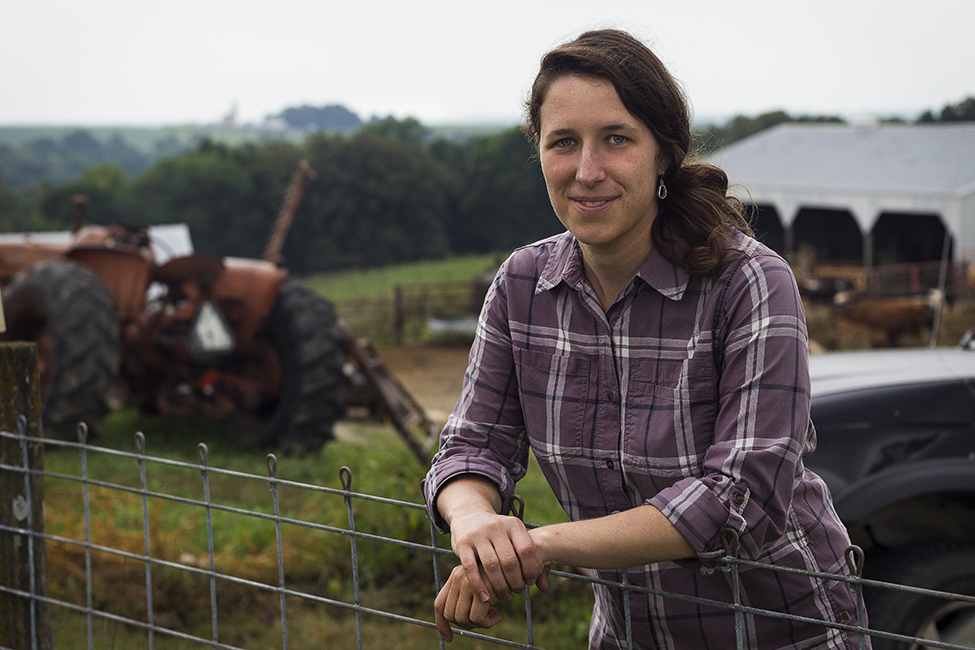
Women seeing themselves as contenders
Kayla Koether ’12 seeks to represent the people of Iowa House District 55 in northeast Iowa as a progressive Democrat (kaylaforiowa.com), and is running against an incumbent Republican, Michael Bergan, in November.
“I am running for the Iowa House of Representatives because, for years, I have been troubled by the trajectory of rural Iowa,” Koether says. “It’s become an expectation that young people will leave to pursue their vocations. It’s become more and more difficult to become a farmer or an entrepreneur here.
“For too long the rural exodus has been viewed as ‘inevitable’ and taken for granted by policymakers. But we rural dwellers are dedicated to our places, and we have a vision of strong rural communities. I want to bring that vision to the Iowa Statehouse,” she adds.
Koether says she thinks the reason for the groundswell of women running for public office across the United States is because we are at a crossroad in our country.
“Many people are feeling a call to duty. Those considering a run for public office realize — and have probably realized for some time — that we are nearing the edge of the cliff,” she says. “The need to step up and set a course toward progress on so many levels — economic stability for all, human relationships, health care access, environmental sustainability — hasn’t been so profound since the lead up to the Great Depression.”
Liz Johnson ’88, co-founder of VoteRunLead (voterunlead.org), a nonprofit that trains women how to run for political office, has worked with several Grinnell College alums over the years, including Koether. According to the organization’s recent survey, which polled 750 potential female candidates, 56 percent of those candidates said they don’t think as many women run for office as men because no one has ever encouraged them to run.
Johnson, who is currently a VoteRunLead board member, says this is changing — especially after the results of the 2016 presidential election. Women are no longer waiting for permission or encouragement to become civic leaders, she said. The number of women seeking training from VoteRunLead to run for public office across the country has exploded; the organization has trained more than 12,000 women to run for office since November 2016.
“The 2016 election was a real wake-up call for women across the political spectrum,” Johnson says. “We are realizing we can no longer sit on the sidelines of our democracy and think it will represent us well. And communities are looking for women to run for office, especially local office. The leadership of women incorporates our life experiences, providing a perspective in policymaking that is more inclusive and brings more people to the table to solve complex problems.”
Koether agrees with that sentiment.
“In the past, women in particular didn’t see themselves as candidates because they didn’t fit conventional expectations,” she says. “Now, they have seen that the stakes are too high and the system will not fix itself. They must step up so that we can reach our highest aspirations for a vibrant democracy.”
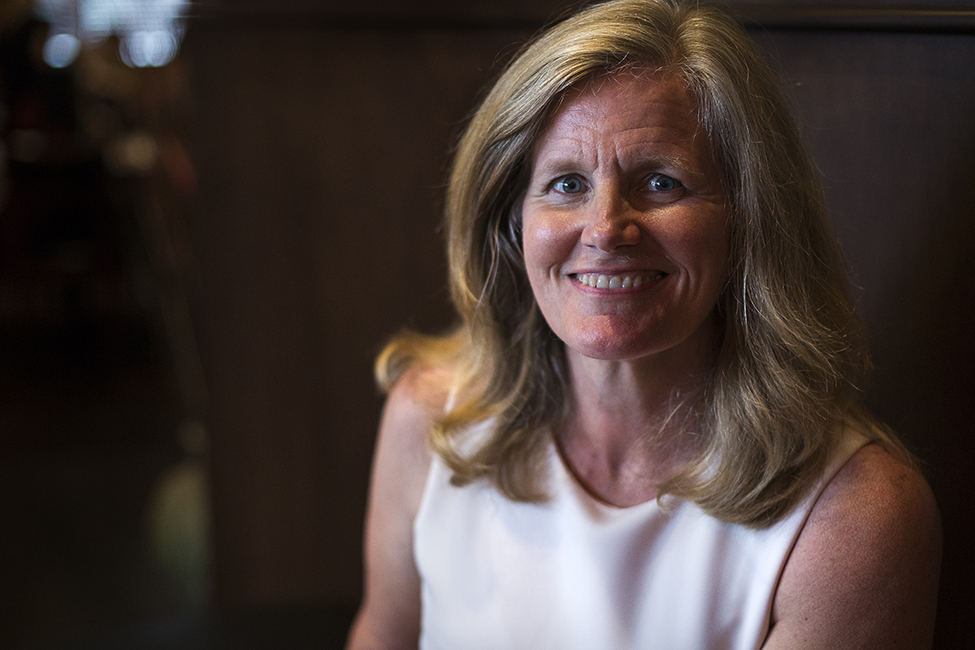
Finding the courage to run
Laura Clymore Ellman ’87, a federal compliance assessor at Argonne National Laboratory, is running for Illinois State Senate in the 21st District (ellmanforillinois.com). Ellman, a Democrat who lives in the Chicago suburb of Naperville, Illinois, hopes to unseat incumbent Republican Michael Connelly. Ellman is focused on helping the state of Illinois find its financial footing and fostering its economic growth. The state’s poor financial shape is among the worst in the nation.
She had never really seriously considered running for public office, citing a lack of experience, “but November 2016 happened,” and Ellman says she suddenly felt qualified. “At the time, it was more ‘why not?’ than ‘why?’ run,” she says.
“I never thought it would be me, and I have never been overly politically active. It was just never one of those things I identified myself with.” By Thanksgiving she knew she would run.
“I decided to run for a lot of reasons. For nearly 20 years, out where I live, the ballots were pretty one-sided: uncontested races, all the same party,” she says. “I’d be frustrated for that one election day, but it never really went beyond that. As I talk to more people, the more convinced I am that we need alternatives; we need to have contrasting opinions on where Illinois is going. Having the same band of people representing us is not in our best interest.”
Grinnell College women up to the challenge
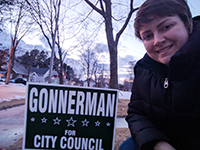 Ellman was not the only Grinnell College alum who decided to run for public office after the 2016 election. Erin Hennessy Gonnerman ’09, who has already won her race and is now a Two Rivers (Wisconsin) City Council member, did, too. “It was three weeks after Nov. 8, 2016, that I picked up my nomination papers to run for city council,” she says.
Ellman was not the only Grinnell College alum who decided to run for public office after the 2016 election. Erin Hennessy Gonnerman ’09, who has already won her race and is now a Two Rivers (Wisconsin) City Council member, did, too. “It was three weeks after Nov. 8, 2016, that I picked up my nomination papers to run for city council,” she says.
Gonnerman, a mechanical engineer at NextEra Energy, says she thinks Grinnell College female alumni are particularly well-suited to running for office.
“Don’t hesitate to run, especially for local offices that can be done while maintaining your full-time job,” she says. “It’s a good way to get involved in the government and help you decide if higher office is something you’d be interested in. City councils and village boards need people with diverse opinions and backgrounds, and they also just need people who are willing to do the work, put the time in, can think critically, and who care about the community.”
Though Grinnell College women may have the strong critical thinking and leadership skills it takes to make good political candidates, they still can face an uphill battle while running. One only need look to the Barbara Lee Foundation’s well-known 2014 report “Keys to Elected Office: The Essential Guide for Women” to see just how difficult it is for women seeking public office.
The guide doesn’t hesitate to show female candidates the cold, hard reality of running. It points out that, when it comes to fundraising, women are often not included in the same well-connected donor circles as their male counterparts. According to the guide, women are judged on their looks, the way they dress, their families — and often have to be more qualified than their male opponents. “Women need to provide more evidence than men of expertise. The first way to relay that to voters is to make an excellent first impression — to hit the ground running and to maintain that momentum throughout the campaign,” the guide states.
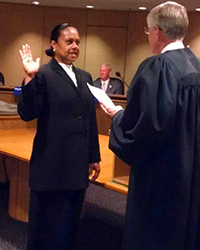 But none of those factors has stopped Grinnell College women in the past. Rita Rawson ’90 was first elected in 2015 and is in her second term as alderman of the 5th Ward in Davenport, Iowa (voteritarawson.com). She is also the only woman of color on the city council. Rawson says the way women can win is by pinpointing important local issues that citizens feel have been ignored. Rawson has been successful in promoting urban revitalization.
But none of those factors has stopped Grinnell College women in the past. Rita Rawson ’90 was first elected in 2015 and is in her second term as alderman of the 5th Ward in Davenport, Iowa (voteritarawson.com). She is also the only woman of color on the city council. Rawson says the way women can win is by pinpointing important local issues that citizens feel have been ignored. Rawson has been successful in promoting urban revitalization.
“The older, core neighborhoods have been neglected for decades,” she says. “But after a lot of hard work, urban revitalization is now the council’s No. 1 goal. When I was running, I never had a thought of ‘I can’t get this done.’ My goal was to always just get it done.”
Her advice to alums currently running for office is to have a vision that you can articulate clearly. “Being yourself and being authentic to your voice and vision, as well as being honest to constituents, is critical.”
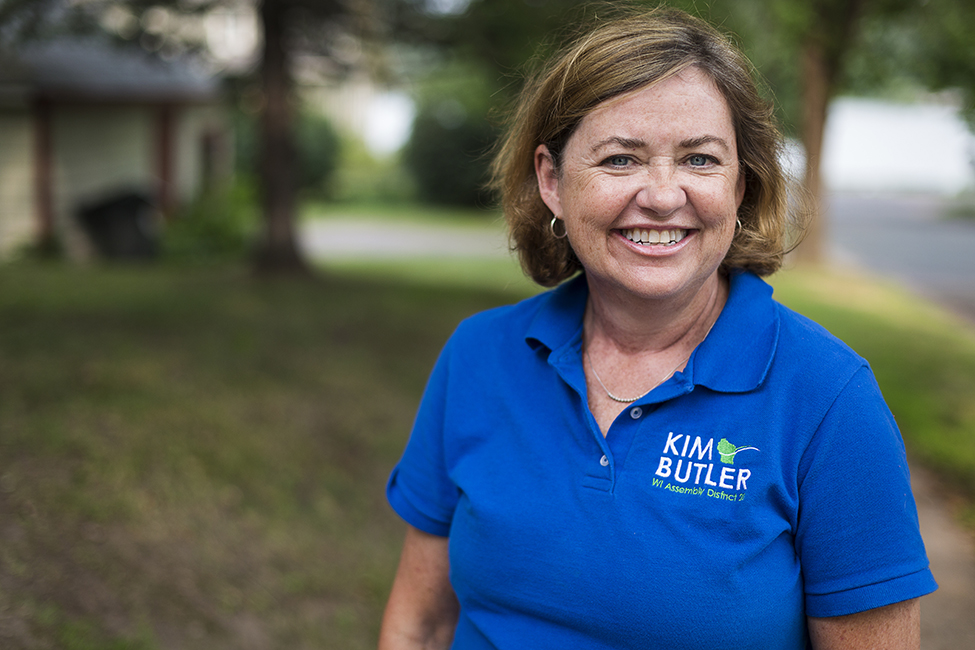
Participating in our democracy effectively
Kim MacDonald Butler ’83, a progressive Democrat who lives in Balsam Lake, Wisconsin, is not letting obstacles get in her way of making a difference in her rural community. She is running for Wisconsin State Assembly District 28 against Republican Gae Magnafici (votekimbutler.com). Previously, Butler was set to race against incumbent Republican Adam Jarchow, but he dropped out of the race after losing a special election for the state senate earlier this year.
“I stepped up to run against the incumbent, assuming I would lose, simply to get the issues of jobs, education, health care, and the environment inserted into the discussion. That he decided not to run for re-election is a happy accident,” she says.
Butler initially decided to get politically involved after her children began high school. “Just voting and giving money every once in a while was not getting the results I wanted,” she says.
So in early 2016, Butler joined the Polk County Democrats; by late 2016 she was elected co-chair of the group. However, it was only after being chosen as a delegate to attend the 2016 Democratic National Convention in Philadelphia on behalf of presidential candidate Bernie Sanders that she was truly inspired to run for state assembly.
“There was something about Bernie Sanders that really touched me. Largely it was his focus and speaking on income inequality,” Butler says. “So when he said, ‘Go join your local Democratic party,’ I did. Then he said, ‘Go to your local caucus and make sure everything was fair,’ so I went and eventually moved up and was elected as a delegate for the national convention. It was a really eye-opening experience for me, seeing so many people so passionate about politics.”
For Butler, campaign training has been instrumental in giving her the tools she needs to run for office. The first major training camp she attended was Camp Wellstone, a weekend-long program targeted to grass-roots progressive candidates. “You learn all the things you need to know to be a candidate; how to raise money and win your race,” she says.
After completing a couple of other training programs, she connected with Liz Johnson at a VoteRunLead training camp, which Butler attended to gain more knowledge about running as a female candidate. It was there she also re-connected with Koether, whom she had first met at Camp Wellstone.
Koether says that connecting with fellow Grinnell College graduates was the final push she needed to decide to run for state office.
“It was heartening to run into other Grinnellians, including Kim Butler and Liz Johnson, at the campaign trainings I attended as I was making the decision to run,” she says. “Feeling grounded and part of a supportive community was key in helping me find the courage to put my name on the ballot.”
She continues, “At one of those trainings, a woman told me that running for office is like ‘getting a Ph.D. in life,’ because you hear so many stories and see the world through so many different perspectives. Going out and talking with people in our communities — and helping people find ways to talk to each other — is exactly what I wanted to be doing during these troubled times."
Ellman adds that you should not let running for office scare you — you have more to contribute than you realize, she says, and the time is now.
“A common belief is that those seeking office have loftier ideals than just normal folks. But maybe now OUR loftier ideals should push us to run,” she says. “If you have considered it but thought the barriers too high, think again. Once you get started and commit, those barriers become much more manageable.”

